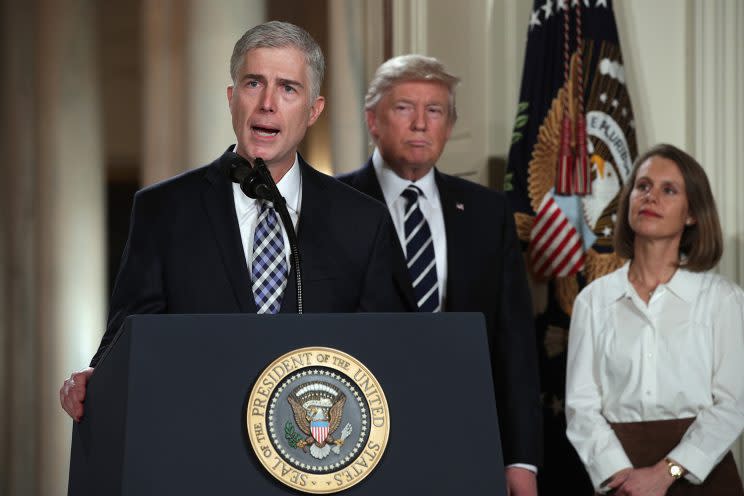Stories to watch: The looming battle over the Supreme Court

Donald Trump is in the White House, and Yahoo News is taking a look at the top stories to watch in his first 100 days. From the unusual role family members will play as White House advisers to his promises to aggressively transform U.S. trade policy, and from investigations into Russian interference in the election to his relationship with Paul Ryan, we’ll be rolling out 15 stories over five days — signposts for the road ahead.
_____
THE STAKES
The direction of the country for years to come could be at stake as the Senate begins consideration of President Trump’s first Supreme Court nominee, Neil Gorsuch. Will Democrats, still angry over the treatment of Barack Obama’s nominee Merrick Garland, band together to block him? Or will they hold their fire for Trump’s second pick, which will likely come in the next four years?
_____
THE STORY
Trump unveiled his choice to fill the late Justice Antonin Scalia’s seat with typical showmanship, leaving the media in suspense between his rumored top picks Gorsuch and Judge Thomas Hardiman until the last possible minute — leading to comparisons to “The Bachelor.”
But despite the theatrics around the announcement, Gorsuch is an establishment pick who would have likely been on any Republican president’s shortlist for the Supreme Court. The Colorado federal appellate judge went to Harvard Law School and is respected by both liberal and conservative colleagues. President Barack Obama’s former acting solicitor general penned an op-ed endorsing him after he was announced, calling him a man of “fairness and decency.” SCOTUSblog argues that Gorsuch is ideologically similar to the conservative Scalia, given his strict textualism, lively opinions and disapproval of attempts to clear public spaces of religious expression.
This presents a problem for Senate Democrats, who were eager to argue that Trump had picked a jurist well out of the “mainstream” so they could block consideration of the nominee. The lawmakers are still angry over Senate Republicans’ unanimous refusal to even consider Garland. Last month, Sen. Chuck Schumer argued that the seat was “stolen” and he might attempt to hold it open until 2020.
A minority is able to block a Supreme Court nominee thanks to the filibuster, which takes 60 votes to overcome. Republicans currently have 52 seats — meaning they need a good chunk of Democrats to side with them to bring Gorsuch’s nomination to a vote.
But Majority Leader Mitch McConnell, R-Ky., has already hinted in multiple interviews he would be willing to change Senate rules to end the filibuster. On Wednesday, Trump joined in this call, urging Senate Republicans to take the so-called nuclear option and change the rules. “If we end up with that gridlock, I would say if you can, Mitch, go nuclear,” Trump said.
This has put the Democrats in a difficult situation. On the one hand, they may want to let Gorsuch through the process, reserving the 60-vote filibuster standard for possible future Trump picks. But on the other hand, Democrats are defending more than 20 seats in 2018 while Republicans only have eight up for reelection, which means it’s possible they will become an even smaller minority in two years, giving them reason to want to stage the fight now. Democratic senators are also facing pressure from their base to oppose Trump’s nominees, and will likely face blowback if they let Gorsuch through without a fight.
Democrats who want to block Gorsuch will paint him as out of the “mainstream,” pointing to his decision allowing religious employers not to provide health plans that cover contraception and saying he favors corporations’ rights over individuals. But at least one conservative group, the Judicial Crisis Network, has already launched a $10 million advertising campaign targeting Senate Democrats in red-leaning states, pressuring them to allow a vote on Gorsuch. “We will ultimately force vulnerable senators to choose between obstructing and keeping their Senate seats,” the group’s chief counsel, Carrie Severino, said.
_____
THE PLAYERS
McConnell and Schumer call the shots for their respective parties in the Senate, although the chairman of the Judiciary Committee, Chuck Grassley of Iowa, and the ranking Democrat, Dianne Feinstein of California, will play a role in implementing their leaders’ strategies.
Democrats will grill Gorsuch on his philosophy and try to pin him down on hot-button issues such as abortion, but unless something disqualifying turns up in his background, his fate depends more on larger political forces than on the answers he may give at his hearing.
The wild cards are the other eight justices, especially the two oldest, Ruth Bader Ginsburg, 83, and Anthony Kennedy, 80. Any signs they might leave the court soon would change the calculus about Gorsuch in unpredictable ways.
_____
Read more from Yahoo News:



